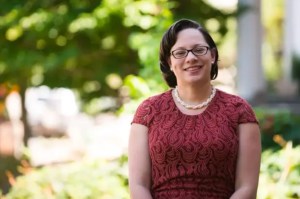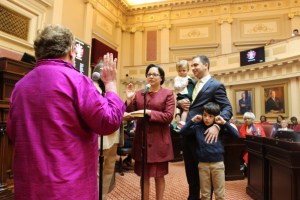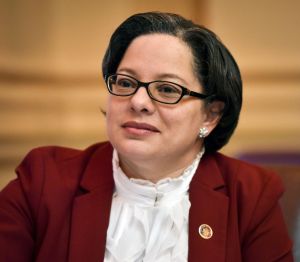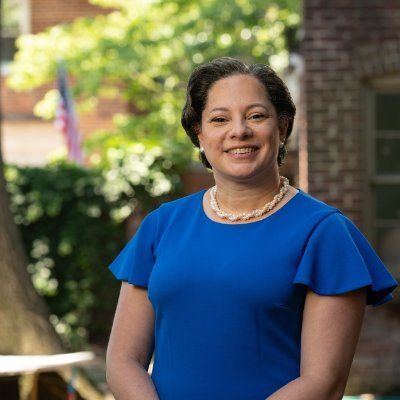‘Boldly Into The Future’: Jennifer McClellan In The Race To Become The Nation’s First Black Woman Governor

Source: Darryl Wingo / Jennifer McClellan For Governor
Jennifer McClellan is running for governor in Virginia, joining a legion of Black women lawmakers who are vying to make progressive change in the political sphere, emerging as a first of firsts.
McClellan, a Democrat in the state legislature for over 14 years, will be the first Black woman to serve as governor in the United States if she is elected in November. It’s a feat that she does not take lightly in a state that will undoubtedly be surveyed as the next high-stakes election come this fall.
McClellan is running in a field of a wide range of candidates who want to replace Gov. Ralph Northam, whose tenure was marked by a Blackface scandal.
At this critical time in our history, we’ve been afraid, outraged, and inspired. Where do we go from here?
Boldly into the future.
I’m running for Governor of Virginia to rebuild an inclusive Commonwealth and transform pain into action. Join me: https://t.co/HrLj3QxrTC pic.twitter.com/s80JFP0E4Z
— Jennifer McClellan (@JennMcClellanVA) June 18, 2020
McClellan is up against three other Black women candidates, former state delegate Jennifer Carroll Foy, Princess Blanding, an activist whose brother was killed by law enforcement, and former Roanoke Sheriff Octavia Johnson.
“While my candidacy is historic, this isn’t a moment about me,” McClellan said in an interview with NewsOne. “This is a movement about the future Virginia that will emerge from these crises stronger and more united than ever. I’m honored and excited that a little girl who grew up in Virginia from parents who grew up in the Depression can lead that healing.”
Her platform revolves around her lived experiences as a descendant of educators and a mother of two. McClellan hopes that if elected, her time as governor can be spent addressing the inequities that have disproportionately affected Black communities, as well as Virginians who routinely face disenfranchisement. That means reforming systems which were built to exclude, including universal childcare, expanding health care access, addressing environmental justice and last, but not least, criminal justice reform.
“At my core, I am a servant leader who sees pain and wants to heal it, sees problems and wants to fix them,” McClellan said. “Virginia really is, like our country, we’re at a crossroads of four crises. The worst health pandemic in 100 years, the worst economic crisis since the Great Depression, reckoning with racial injustice, and a lot of people who have lost faith in government’s ability to understand their problems, let alone solve them. I’m running because I hear the call to help people and lead us through these crises in a way that brings us together, and gives hope, and addresses inequity, and begins to heal from 400 years of trauma that has all culminated up to this point.”
*This interview has been edited and condensed for clarity.
NewsOne: First, I wanted to ask you, who are some of the Black women that you look to that laid the foundation for where you are in this moment?
Sen. Jennifer McClellan: I have to start with my mother because in part, all of us, our political views and who we are as people are shaped by our family and our experiences. My mom grew up in the Gulf Coast of Mississippi. She was born in 1932, the third youngest of 14 children. All of the women in her family were domestics, all of the men in her family either did the military or were laborers. She was the first member of her family to go beyond the eighth grade, because the only school for Black kids was the Catholic church and it only went to eighth grade. And yet she worked for a year as a domestic so that she could move to Jackson and live with her sister and go to high school because she understood that was her way out. And then made her way to Arkansas State working food services, where she met my father and eventually became a daycare owner and a college counselor. By the time I was born and they lived in Virginia, she ran three federally funded programs for at-risk college students at Virginia State University and raised three children. Her life showed me how no matter how things are stacked against you, no matter the racism and sexism that she faced, that she’s a really good example of just a strong Black woman and working mother who raised my sisters and I to have the confidence that we could do whatever we wanted to do, but we’d have to work hard and persevere.
Politically, I’d have to point to Maggie Walker, who was the first African-American woman to run for statewide office 100 years ago here in Virginia. [Walker was a] community leader and business woman, a real role model back when times were extremely tough. Shirley Chisholm more recently, Jean Cunningham who was a delegate that proceeded me but has also served as a mentor. Cunningham, Viola Baskerville, and then me, represented the 71st District in the House of Delegates, and both them of have been mentors and role models in different ways. I think those would be the ones I’d point to the most.
NO: Speaking of history and looking to the past, you’re the daughter of educators and you’re a native of a state with a complicated history, especially in terms of race. Why did you feel that now was the moment to run for governor?
JM: Personally, it’s the culmination of a life of servant leadership that caused me to first be a party activist in community access and then eventually leader, and an elected official. But before COVID, as much progress as I’ve been able to make in the legislature, too many Virginians, and too many parts of Virginia were being left behind. And then COVID made that worse. Now, we need someone who brings a new perspective, but who has experience to get things done, who has a clear understanding of our history and how it still impacts our present, and who can focus on rebuilding our economy, our healthcare, economic safety nets, our education system in a way that addresses inequity [to] brings us together and focuses on solving these problems.
NO: What about your lived experience sets you apart from the other candidates who have a voice that they are in launched campaigns?
JM: It is the experience of the daughter of parents who grew up in the segregated South during the Depression, has lived through Jim Crow, and lived through times when government focused to solve people’s problems, and who became the first member of the House of Delegates to be pregnant while in office, and has faced having to find childcare and having a hard time doing it. It’s not just my life experiences, but the life experiences of my entire family and people around me that I have seen and recognized those perspectives haven’t had a seat at the table. I have more state government experience than all of my opponents combined, and a record of bringing people together to solve problems, building broad coalitions and uplifting those voices and perspectives that have not been in the room.
I can on day-one, seeing very clearly how we got where we are and seeing very clearly where we need to go, work to get that done and build on my own record of progressive change. I’ve led on transformative, progressive change in just two years since we’ve been the majority. But then you add to that my 15 years of state government experience, my 30 years of experience in the communities and in the party as an organizer and leader, I’m ready to tackle these problems on day-one in a way that brings people together and takes the policy-making table out into our community.
NO: COVID has changed campaigning and being more interactive with constituents. When you do have opportunities to be in the presence of voters, what are usually their top concerns in Virginia and how would your governorship work to change those concerns?
JM: Not surprisingly it’s how do we rebuild our economy, and our healthcare system, and our economic safety net for our education system in a way that doesn’t leave anybody behind and addresses that inequity and people’s needs? A lot of people are concerned about school. They were before COVID. A lot of people are concerned about access to a good job. They were before COVID. Finding access to healthcare. That was a problem before COVID. But now, everything is harder. They just want somebody who’s going to solve their problems and give them hope. I’ve been working to do that already for 15 years and I’m ready to do that as governor.

Source: Jennifer McClellan For Governor
NO: Could you expand some more on what would be a part of your governorship, or what specific policies you would implement?
JM: The first two plans that I launched deal with education. So a universal childcare and early childhood education plan that recognizes the equity gap starts at birth. I’m going to tell you a quick story. My son is now 10, my daughter is five, but when my son started kindergarten and I talked to his teacher and asked her, “What is the biggest change she’s seen in your 20 years?” She’s like, “Look, kindergarten used to be where the soft skills were taught. Now, it’s all academic. I can tell on day-one which kids have had some formal early childhood education and which ones haven’t.”
When you combine that with how many parents, and mostly mothers have been forced out of the workplace due to COVID, like 90% of the job losses in December were working moms who didn’t have childcare. I recognize that childcare and early childhood education is a foundation for economic opportunity and recovery. And so I will work to build universal childcare and make sure that no family pays more than 7% of their income limit.
And then I will rebuild our education system in a way that fully meets our K-12 needs in an equitable way. And so that’s my number one priority is education because it’s key to economic opportunity, it’s key to a thriving, healthy community. And as we saw in the past four years, it’s key to a thriving, healthy democracy. Hopefully, by the time I’m governor, everybody will have been vaccinated and COVID is behind us. But if not, I’ve got to continue to lead us through that crisis and make sure that everyone is getting access to testing, and contact tracing, and vaccines, and we’re keeping people safe and healthy.
NO: I know that the role of governor, just like the role of any person who has office is to be a voice for all of their constituents. However, I think one of the things that comes up, especially in a state like Virginia that has a large Black population is how will they address social justice issues or issues that affect a large portion of the community? I know that one of the individuals who announced that they wanted to run for governor, Princess Blanding, she’s running more so on a social justice platform being that her brother was killed during a mental health intervention with police a few years ago. And so I wanted to ask you specifically if social justice is a large framework of the platform that you’re running on and what laws or what statutes you feel can be revised to add to equity the lives of Black Virginians?
JM: Every single system we have in Virginia has racial inequity baked into it. You got to understand, Virginia was built on a power structure 400 years ago that put white landowning English men at the top. The first Africans that came were put in service to them and treated as property. The first women that were recruited here were as wives to serve those men. So everything was created with inequity baked into it and decades and centuries of laws based on white supremacy. That shapes who we are. The impact of those laws didn’t go away when the laws were changed.
And so everything I do, whether it is focusing on our education system, whether it is reforming our criminal justice system, whether it is addressing climate change through a lens of environmental justice, whether it’s addressing affordable housing and the patterns of segregation put in place 100 years ago, every policy I have ever pushed for as a legislator and definitely as governor is framed from that lens. For example, when worker protections were put in place, domestic workers were excluded. Jobs that were held by Black people were excluded. I was able to pass the first Domestic Worker Bill of Rights in the South that gave them access to a minimum wage, our anti-discrimination laws and workplace safety laws, and will continue whether it’s economic policy, education policy, transportation policy, environmental policy, everything will be viewed through a frame of, how do we address inequity that has always been there but has been made worse by COVID?

Source: The Washington Post / Getty
NO: Because you’re running for governor in a Southern state, and it would make you the first Black woman and the first woman to be governor, if you were to be elected, that automatically gives comparison to Stacey Abrams and her 2018 run in Georgia. With Kamala Harris’s historic election, there’s a lot of just discussion regarding the role Black women play in American politics, whether they are legislators or even the voting electorate. What would it mean to you personally if you made history, if you were elected governor of Virginia this year?
JM: I feel the weight of it. Knowing that my great-grandfather had to take a literacy test and find three white people to vouch for him just to be able to vote and my great-grandmother couldn’t. Knowing that I am my ancestor’s wildest dreams and everything that they and many others fought for and sacrificed for to put me in a position where I could even think about being the first Black woman governor in the country, it makes me incredibly proud and grateful for their sacrifice. It also fueled me because I’m fighting the same fights that they did on a lot of ways. I can’t look my kids in the eye and say, “I did everything I could to keep them from fighting those fights, unless I step up and do everything.” And to be governor is a way to help keep them from fighting those fights.
I’m also blazing a path for them or other little girls, little Black girls or girls of color, for them to follow. So I definitely feel the weight of it and the gravity of it, but Black women have been the backbone of this country from the beginning, literally. We’ve been the backbone of the Democratic Party, even before we could vote, just fighting to get the right to vote. And yet in every major movement, we’ve been relegated to the back. I’m a Delta. So literally, whether it was the founders of Delta being told, “March in the back of the suffragette march in 1913.” Or the women of the civil rights movement who we weren’t given a speaking role at the March on Washington. We were still there, fighting and pushing to make everybody’s life better.
I’m not contented to sit in the back and do the work anymore. It is time for us to lead and we are needed. This country, this Commonwealth needs for us to lead, and especially, if we’re ever going to heal from all of the scars of 401 years of racial and gender inequity. It is time for us to lead.
NO: The last election reminded everyone why you can never count the South out. We’ve had glimpses of this lesson in 2018 when Black women helped elect Senator Doug Jones to the Senate seat in Alabama. And then in your own state, in 2008, when Virginia and North Carolina flipped to blue. Many feel Virginia will emerge as the next state to watch after Georgia gained so much attention in the 2020 election. Do you feel that that is true, that all eyes will be on Virginia with this upcoming election?
JM: I do, I do. And again, Virginia has led the way from the beginning and been on the right end, wrong side of history leading. We’re the birthplace of American democracy and the birthplace of American slavery. So I think all eyes, we’re usually a harbinger of what’s going to happen. It is time, and I think poetic justice for us to be the state that elects the first Black woman governor. The gains that we have made on the backs of Black women is not a fluke.
NO: What are some of the policies that you worked on that you feel can serve as a template for what can be done across America? And then just, secondly, if you are elected in November, what do you feel would be your first plan of action as you step into the governor’s seat?
JM: In the past two years alone, I have passed bills that has made Virginia the first state in the South to do a number of things. The Virginia Clean Economy Act, which transformed our energy policy and made us the first state in the South to have 100% clean energy standard and shift away from fossil fuels, to address climate change and create new jobs. The Domestic Worker Bill of Rights. The Reproductive Health Protection Act made us the first state in the South to proactively protect access to reproductive health by repealing laws that I fought against when I was the first pregnant member of the House of Delegates in 2010. The Voting Rights Act of Virginia that makes us the first state in the South to have our own voting rights act. Going back, this was several years ago, but I reformed Virginia’s child marriage laws and ended practices where someone could rape a 14-year-old and then marry her and not go to jail.
Bills to break the school to prison pipeline, to address affordable housing, are just a few of the things that I’ve done. As governor, my first job will be introducing a budget that begins to fully fund our public education needs in a way that leaves no child behind, no matter their ZIP code or their racial background, that stabilizes and rebuilds our childcare system so that working parents can get back to work to rebuild our economy in a way that leaves no Virginian behind. And stabilize our healthcare system so that everybody knows that if they get sick or injured, they can go to the doctor and not go bankrupt. And again, hopefully, we will have turned the corner on COVID. But if not, making sure that I’m leading, are leading us through COVID in a way where your access to testing and vaccines doesn’t depend on where you live, or your job, or your race.
SEE ALSO:
‘I’m In This For We’: Mckayla Wilkes On Why She’s Challenging Steny Hoyer For His Seat In Congress
Meet The Black Women Joe Biden Considered To Be His Vice Presidential Running Mate
[ione_media_gallery id=”3905476″ overlay=”true”]

